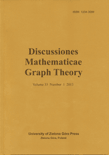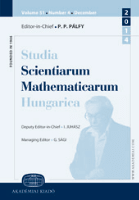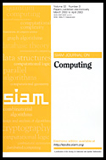
Discussiones Mathematicae Graph Theory
Scope & Guideline
Exploring the Depths of Discrete Mathematics
Introduction
Aims and Scopes
- Graph Connectivity and Structure:
Research focusing on the connectivity properties of graphs, such as k-connectivity, matchings, and the structure of specific types of graphs like bipartite and planar graphs. - Domination and Coloring Problems:
Exploration of domination parameters, various coloring problems (including total, equitable, and chromatic numbers), and their implications for graph theory. - Ramsey Theory and Extremal Graphs:
Investigating Ramsey numbers, Turan problems, and extremal graph theory, with a focus on understanding how certain properties can be maintained across various graph configurations. - Graph Algorithms and Combinatorial Optimization:
Development and analysis of algorithms for solving graph-related problems, including optimization techniques and computational complexity. - Applications of Graph Theory:
Utilization of graph theory concepts in real-world applications, including network design, social networks, and biological systems.
Trending and Emerging
- Advanced Domination and Resource Allocation:
An increased emphasis on advanced domination concepts, such as fractional and total domination, reflects a growing interest in resource distribution models in networks. - Graph Games and Strategic Interactions:
Research on games involving graph structures, such as domination games and graph grabbing games, is trending, indicating an interest in the interplay between combinatorial game theory and graph theory. - Spectral Graph Theory:
A rising trend in the application of spectral methods to analyze graph properties and behaviors, indicating a deeper exploration of eigenvalues and their implications. - Interdisciplinary Applications:
Emerging studies that apply graph theoretical concepts to fields such as computer science, biology, and social sciences demonstrate a trend towards interdisciplinary research. - Dynamic and Evolving Graphs:
Research focusing on graphs that evolve over time, including topics such as dynamic connectivity and temporal networks, is gaining traction, reflecting real-world applications.
Declining or Waning
- Classical Graph Enumeration:
Research focused on classical enumeration problems, such as counting specific types of graphs or configurations, has become less frequent as new methods and areas of interest emerge. - Basic Properties of Specific Graph Classes:
Studies that merely describe or catalog properties of well-known graph classes without substantial theoretical advancements are becoming less common. - Elementary Graph Theory:
Basic results and simple proofs in graph theory are seeing a decline, as the field increasingly emphasizes deeper, more complex results and methodologies.
Similar Journals

GRAPHS AND COMBINATORICS
Exploring the intricate world of graphs and combinatorics.GRAPHS AND COMBINATORICS, published by SPRINGER JAPAN KK, is a premier academic journal dedicated to advancing the field of discrete mathematics and combinatorial theory. ISSN 0911-0119 and E-ISSN 1435-5914 signify its scholarly accessibility, providing a platform for the dissemination of cutting-edge research from 1985 to the present. With a 2023 quartile ranking of Q2 in Discrete Mathematics and Combinatorics and Q3 in Theoretical Computer Science, the journal showcases influential studies that significantly contribute to these domains. Situated in Tokyo, Japan, it harnesses a global perspective on contemporary mathematical challenges. Although lacking open access options, GRAPHS AND COMBINATORICS remains a vital resource for researchers, professionals, and students seeking to deepen their understanding of mathematical graph theory and combinatorial structures. Engage with its significant findings and join the discourse that shapes future research and applications in these inspiring fields.

ARS Mathematica Contemporanea
Pioneering Insights in Contemporary MathematicsARS Mathematica Contemporanea, published by UP FAMNIT in Slovenia, stands as a pivotal journal within the fields of algebra, number theory, discrete mathematics, geometric topology, and theoretical computer science. Since its inception in 2011, this journal has consistently provided a rich platform for innovative research, garnering a commendable Q2 category ranking in various mathematical domains, including Algebra and Number Theory, and Geometry and Topology, showcasing its growing influence and prestige in the academic community. With an increasing Scopus rank—particularly notable in Algebra and Number Theory at the 71st percentile—ARS Mathematica Contemporanea is dedicated to publishing high-quality, peer-reviewed content that advances the frontiers of mathematical knowledge. The journal’s commitment to open access ensures that valuable research is readily available to scholars, practitioners, and students alike, fostering collaboration and dissemination of ideas across the globe. As it converges towards its dedicated timeline extending to 2024, ARS Mathematica Contemporanea remains a crucial resource for those engaged in mathematical research, presenting an array of theoretical and practical insights that define contemporary mathematical discourse.

STUDIA SCIENTIARUM MATHEMATICARUM HUNGARICA
Exploring the Depths of Mathematical InnovationSTUDIA SCIENTIARUM MATHEMATICARUM HUNGARICA is a distinguished journal published by AKADEMIAI KIADO ZRT, focusing on the vast field of mathematics, specifically categorized under general mathematics. With its ISSN 0081-6906 and E-ISSN 1588-2896, this journal has been a critical platform for mathematicians, researchers, and educators since its inception in 1996, continuously evolving through to 2024. Based in Hungary, it holds an impact factor that positions it in the 3rd quartile for mathematics in the 2023 rankings, reflecting its contribution to academic discourse within the discipline. Though not an open-access journal, STUDIA SCIENTIARUM MATHEMATICARUM HUNGARICA serves as an important repository of innovative research findings and methodologies, making it a vital resource for professionals and students striving to stay ahead in the rapidly advancing world of mathematics. The journal's commitment to quality and rigor enhances its relevance, evidenced by its Scopus rank in the 51st percentile overall in the general mathematics category.

COMBINATORICA
Exploring the Depths of Discrete Mathematics ExcellenceCOMBINATORICA, published by Springer Heidelberg, is a leading international journal dedicated to advancing the fields of Discrete Mathematics and Combinatorics. With an illustrious history dating back to 1981 and a remarkable commitment to excellence, this journal has earned its place in the highest echelons of academic publishing, currently ranked in the Q1 category for both Computational Mathematics and Discrete Mathematics and Combinatorics. Located in Germany and recognized for its high-quality research contributions, COMBINATORICA fosters innovative discussions and disseminates significant findings that shape contemporary mathematical theory. Although it does not offer Open Access options, its rigorous peer-review process ensures that each publication meets the highest scholarly standards, making it an essential resource for researchers, professionals, and students engaged in mathematical sciences. With an impactful H-Index reflecting its citation influence, COMBINATORICA continues to be a pivotal platform for groundbreaking research in combinatorics and its applications.

DISCRETE MATHEMATICS AND THEORETICAL COMPUTER SCIENCE
Pioneering Insights in Discrete Mathematics and Theoretical ComputingDISCRETE MATHEMATICS AND THEORETICAL COMPUTER SCIENCE, published by DISCRETE MATHEMATICS THEORETICAL COMPUTER SCIENCE in France, stands as a significant open-access journal since 1997, publishing innovative research articles within the intersecting disciplines of discrete mathematics and theoretical computer science. With an ISSN of 1462-7264 and an E-ISSN of 1365-8050, this journal aims to provide a platform for scholarly discourse and dissemination of knowledge, making it accessible to a global audience. It is recognized for its contributions, achieving a Q2 ranking in both Computer Science (Miscellaneous) and Discrete Mathematics and Combinatorics, alongside a Q3 ranking in Theoretical Computer Science as of 2023. The journal’s rigorous selection process ensures that only high-quality research is published, promoting advancements in these critical areas of study. Researchers, professionals, and students alike can benefit from its comprehensive articles that not only enhance theoretical understanding but also foster practical applications in the ever-evolving landscape of computer science.

Prikladnaya Diskretnaya Matematika
Connecting Scholars with Cutting-Edge Computational Insights.Prikladnaya Diskretnaya Matematika, published by the PUBLISHING HOUSE SCIENTIFIC & TECHNICAL LITERATURE in the Russian Federation, serves as a vital resource for scholars and practitioners in the realms of applied mathematics, computational theory, and discrete mathematics. With an ISSN of 2071-0410 and an E-ISSN of 2311-2263, this journal has been actively contributing to the academic discourse since its inception in 2016, with expectations to continue until at least 2024. Although currently positioned in the Q4 category across several disciplines—including applied mathematics, computational theory, and signal processing—this journal offers a unique opportunity for researchers to contribute to an evolving field, despite facing competitive rankings in the Scopus database. The open access nature of the journal reflects a commitment to disseminating knowledge broadly, albeit details regarding access options remain unspecified. As a publication dedicated to fostering innovation and collaboration in theoretical and practical applications, Prikladnaya Diskretnaya Matematika plays an important role in advancing mathematical theories and practices, making it pertinent for those engaged in research and application within these critical domains.

Australasian Journal of Combinatorics
Empowering Scholars in Discrete MathematicsThe Australasian Journal of Combinatorics, published by the CENTRE DISCRETE MATHEMATICS & COMPUTING, serves as a vital platform for researchers and professionals engaged in the dynamic field of discrete mathematics and combinatorics. With an ISSN of 2202-3518 and an E-ISSN of the same, this journal has been committed to open access since 2014, ensuring that groundbreaking research is readily available to a global audience. Based in Australia, specifically at the Department of Mathematics, University of Queensland, this journal spans the years from 1996 to 2024, showcasing the evolution of combinatorial research over nearly three decades. Recognized in the 2023 category quartiles as Q3 in Discrete Mathematics and Combinatorics, it ranks 68th out of 92 in Scopus, reflecting its growing influence despite its current percentile of 26th. The Australasian Journal of Combinatorics is dedicated to fostering innovative research and theoretical development, making it a valuable resource for academics and students alike.

Journal of Combinatorics
Championing High-Quality Research in Combinatorial TheoryJournal of Combinatorics is a premier academic journal dedicated to advancing the field of combinatorial theory and its applications. Published by INT PRESS BOSTON, INC, it aims to provide a robust platform for researchers, professionals, and students to disseminate their findings and engage with cutting-edge developments in combinatorics. With a focus on high-quality, peer-reviewed articles, the journal fosters rigorous mathematical discussions surrounding various facets of combinatorial structures, graph theory, design theory, and combinatorial optimization. Although currently not available as an Open Access journal, the Journal of Combinatorics plays a vital role in enriching the mathematical sciences and serves as an essential resource for academics seeking to stay updated with the latest trends in combinatorial research. By maintaining a commitment to excellence and innovation, this journal is indispensable for anyone looking to deepen their understanding in this critical area of study.

SIAM JOURNAL ON COMPUTING
Pioneering Research at the Intersection of Mathematics and Computing.Welcome to the SIAM Journal on Computing, a premier publication of SIAM Publications dedicated to advancing the field of computational science. Established in 1984, this journal provides a platform for groundbreaking research and theoretical advancements that shape the landscape of both Computer Science and Mathematics. With an impressive impact factor and consistently ranking in Q1 quartiles for its categories, the journal remains an essential resource for scholars looking to contribute to innovative computational theories and methodologies. Although not currently an open-access journal, the SIAM Journal on Computing offers rigorous peer-reviewed articles, ensuring high-quality contributions that appeal to researchers, professionals, and students alike. As we converge towards 2024, this journal continues to play a vital role in influencing future research directions and fostering an academic community devoted to the exploration of computational challenges. Join us in exploring the forefront of computing research!

Communications in Combinatorics and Optimization
Catalyzing Knowledge Exchange in Combinatorial ScienceCommunications in Combinatorics and Optimization is a prestigious open-access journal published by Azerbaijan Shahid Madani University, focused on advancing research in the fields of combinatorial mathematics and optimization. Since its inception in 2016, the journal has established a reputation for disseminating high-quality research, achieving a commendable Q2 ranking in both Control and Optimization and Discrete Mathematics and Combinatorics as of 2023. With a Scopus ranking of #13 in Discrete Mathematics and Combinatorics, it is positioned in the top 14% of its field, underscoring its significance in the academic community. By providing unrestricted access to its articles, the journal promotes the widespread dissemination of knowledge, fostering collaboration and innovation among researchers, professionals, and students around the globe. Based in Iran, the journal continues to contribute to the global discourse on effective combinatorial and optimization techniques that address contemporary challenges.